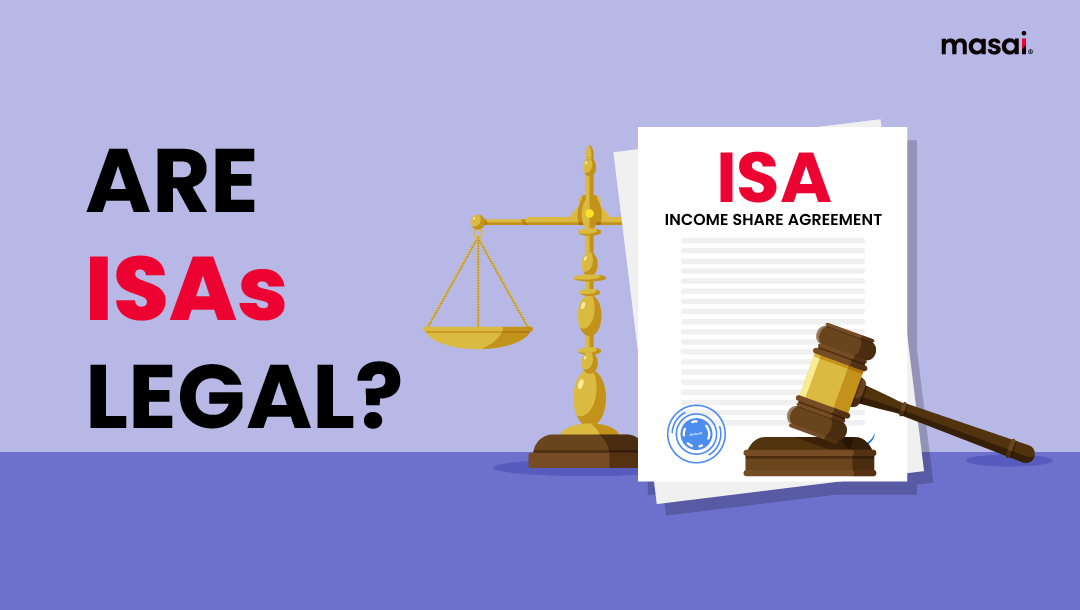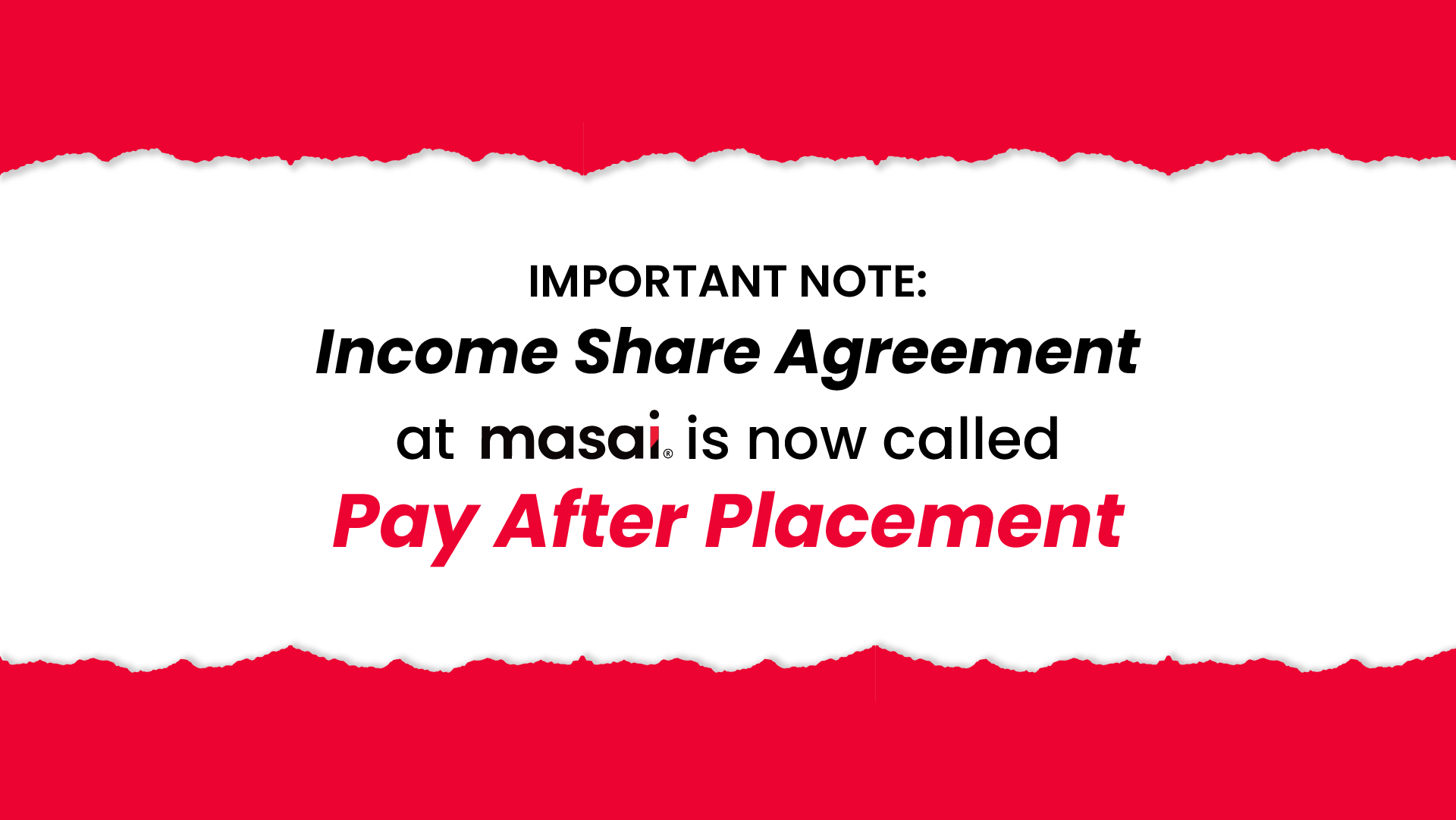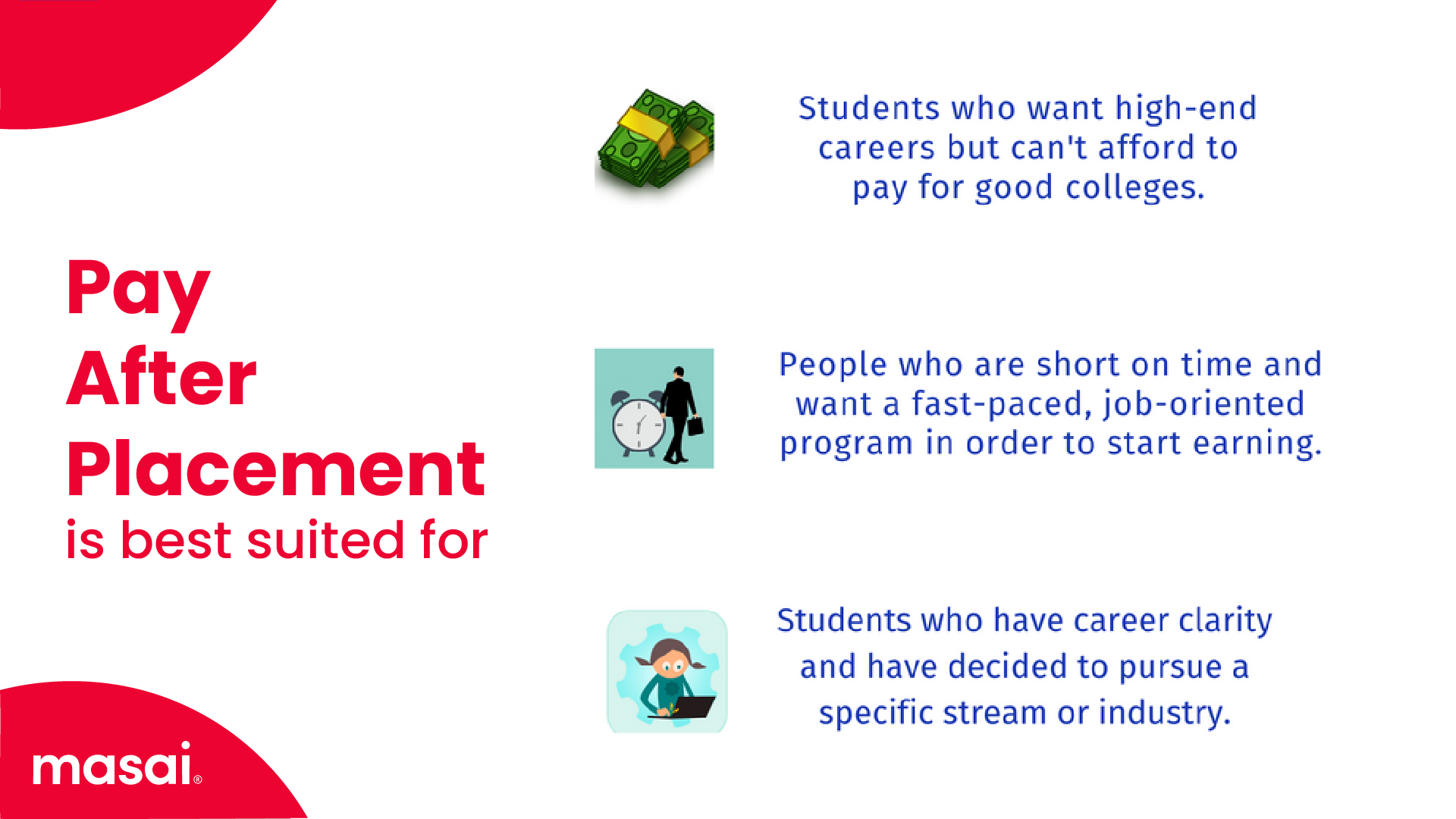Are Income Share Agreements legal in India?
Theft and robbery are illegal, even smoking on a plane is illegal, as the law doesn't permit any of these. But Pay After Placement is not illegal. It's an agreement between two parties.


Income share agreements are not very common in India but are relatively popular in the USA and a few other nations as an innovative financing model. Every underprivileged student should take advantage of income-sharing arrangements or pay-after-placement courses.
Theft and robbery are illegal, even smoking on a plane is illegal, as the law doesn't permit any of these. But Pay After Placement is not illegal. It's an agreement between two parties.
‘An income share agreement (aka ISA) is a contract between a student and an institute that allows a student to learn at zero initial fees in exchange for a fixed percentage of their monthly income for a limited period of time, once they get placed.’
The basic idea behind an ISA is the value transaction between two parties – the student and the educational institute. The student receives education and training, applies that to get the right job, and pays the value back to the institute in the form of fixed shares of their income.
For the sake of better understanding, we’ll go ahead and decode this innovative education financing model i.e. ISA (also known as the Pay After Placement model), and learn about its functioning, variations, and most of all legality.
Let’s get started-
What are Income Share Agreements?
As an alternative to paying for education, you may use an income-sharing agreement or pay after placement courses. In accordance with this system, several universities, colleges, and other educational institutions all around the world have created an innovative financing model that enables you to free course completion as well as a placement guarantee.
You must agree to provide the institution with monthly fees equal to a particular percentage of your income for a predetermined time in return. This practice is known as income sharing, and the contract you sign with the institution is abbreviated ISA (Income Sharing Agreement).
Romeo has aspirations of becoming a software developer. But he's financially challenged to the extent that he can't afford the expensive courses that are available. Yes, he could take a student loan but he doesn't want to run that risk. What if he couldn't get a job after college?
Enters - Income share agreement.
Originally proposed by Milton Friedman, an American economist, an ISA would allow Romeo to start studying at zero upfront fee. Once he gets placed he can pay the tuition amount as part of his monthly income. If he doesn't get placed, he doesn't need to pay anything. No risk and yes rewards!
The maximum period to pay off the ISA amount ranges from 2-10 years and differs from institute to institute.
Sounds like the perfect solution to a huge problem faced by millions of students across the globe. All Romeo has to do is sign an agreement, a contract, and get on his merry way.
That's where the questions arise. Are these agreements legal? Who backs these contracts?
We, in India, are anyway skeptical of signing contracts. They scare us. What if we get caught in some crow trap?
And it's perfectly natural to have doubts, especially when it's about the unknown. (This article will tell you all you need to know about the ISAs).
And if you have a basic idea about ISAs, keep reading as we try to solve all your doubts.
Are Income Share Agreements Legal?
According to the 3rd definition by Merriam-Webster dictionary, legal means something that is conforming to or permitted by law.
Are ISAs permitted by law? Of course, they are. If they were not, don't you think all the ISA bootcamps would have been shut down by now?
Theft and robbery are illegal, selling drugs is illegal, and even smoking on a plane is illegal, as the law doesn't permit any of these.
But ISAs are not illegal. It's an agreement between two parties.
If we were to say that I'd give you free food for a month and you have to pay me half of your next month's salary, the law can't penalize me for making this offer.
However, if we both sign a legal contract (affiliated with the judiciary) and you run away after the first month, then I can file a case against you for breaching the contract. That is a legally binding contract.
It's a similar case with an ISA. If two parties have signed it, and one party decides to breach the contract, the matter could be taken to the judiciary.
In other words, ISA is indeed a legal agreement.
Here's finance influencer Akshat Shrivastava talking about the PAP model:
(Story: Mahesh Guptha went from being a street salesman struggling with his family’s financial issues, to a software developer at LeapFinance, backed by the PAP agreement at Masai)
However, in India, there are no defined rules and regulations regarding the contract terms, payment amount, payment period, etc.
So, if Masai has an ISA amount of INR 3 lakh, and a maximum payment term of 3 years, any other coding bootcamp can have different terms & conditions.
The government of India doesn't have fixed regulations over the terms of the ISA contract, it solely depends on the institutes how much they charge and how much salary they're promising to their students.
Things to look for while signing an ISA
So, what does an ISA contract look like? If there’s no government regulation per se, how does one know what’s what? On what grounds does one make a decision whether to pursue it or not?
There are a few pivotal terms that define an ISA contract:
- Income Threshold - It is the minimum CTC/annual income declared by the institute that makes a graduate liable to pay back the ISA amount/tuition fee. For example: In Masai’s case, a student only needs to pay once he gets a job worth at least INR 3.5 LPA. So, INR 3.5 LPA is the minimum income threshold here.
- Payment Tenure - Of course, a placed student wouldn’t just have to continue paying forever. There’s a fixed time period after which the payments stop and the graduates are free of all responsibilities- that’s the ISA payment tenure.
- Payment Cap - This is the maximum amount a student will pay under any circumstances. There are a few variations to this when it comes to different ISA bootcamps.
Some have flexible payment structures wherein; the total amount payable by the student directly depends on their income. So, a student with say, INR 30 LPA salary would end up paying more than the person with INR 10 LPA salary, over a 3-year tenure.
However, at Masai, the total payment is capped at a single fixed amount for all students regardless of their income. Some students can get done with the whole payment in 1 year or some might take 3 years, but they’ll end up paying the same overall amount.
Mohammed Hassan completed his ISA payment in 12 months
But even if you get a good job about 10 la per annum, if you kind of get a good place in that kind of company, you can saw, you can pay your I s A in minimum, uh, year in here itself.
You can pay your complete i s a as I do. I always considered maiah as my another family because whatever the decision I'm going to take, I first of all consult with my mentors and they are as I stayed in a graduation also, uh, they are not just mentors for my, for this six months which I spent there. They're also mentors for my life.
And still after getting placed in shared chat also many of the time I used to ask them, uh, how can I improve these kind of people over there in my work environment, uh, to make myself unique? What should I do?
How can I show my potential towards them and what's my next date of my life if I start to some problem? Also, they are the first person who are coming, uh, who I can reach them to solve it, and you can guide me in the right direction.
Still, I am used to, can get in touch with Maasai. So it's not that after completing the course, they completely, as in college, it happens, right? So it's not the thing in Maasai school, it's actually a family to move from my heart.
I'm saying that you don't get any mentors outside like this. They, they never let you down.
- Income Share Percentage - As we’d discussed earlier: the ISA payments made by the students are in the form of a fixed percentage of their monthly income. This is the income share percentage. (Masai grads have to pay at least 15% of their monthly income). Again, the number differs from school to school.
The partnership between NBFCs and ISAs
How does the agreement work? How does the school bear the cost of education for a student? Do they really make the investments?
Well, yes they do! But these investments are facilitated by NBFC partners like Propelld and Eduvanz. NBFCs, for those who aren’t aware, are non-banking financial companies engaged in the business of loans and advances. These companies are registered with the RBI and have the license to issue loans and investments to stakeholders.
These NBFC partners act as the backbone of the income share agreement model and provide the financial support to launch students’ careers, by acting as finance aggregators for ISA-based institutes like Masai.
When a student joins Masai, our NBFC partners raise or issue funds in the student’s name. Once, the student gets a high-paying job, they start making payments towards the agreement as monthly installments for a fixed time(2-3 years generally).
However, in case a student’s income falls below the threshold, the school then steps forward and takes up the payment duties towards the NBFC partner.
And that’s how this whole ISA mechanism works backstage in partnership with NBFCs.
Quite similar to how Apple does the Research & Development work for the iPhone and Foxconn, a manufacturing company is responsible for assembling the phones in bulk.
So, if NBFCs are registered with the RBI, and they approve a zero-interest loan to the student through a legally binding contract, there’s no question of the ISA being an illegal contract.
Is ISA better than obtaining a student loan?
ISA is often considered a loan by buyers. This is due to the fact that, similar to how you would return a debt, you would also have to pay back the school where you took the course and the fees.
An ISA, however, differs from a student loan in three key ways:
- While most institutions offering ISAs do not charge interest, loans do.
- Loans are controlled by the nation's central bank, whereas ISA is not.
- In contrast to loans, there is no fee for stopping payments under an ISA.
- If you have the money, you can pay off your loans. It is yet unknown how ISA works in this area.
Income Share Agreements are similar to 0% EMI plans in which a customer can utilize a product entirely while paying for it over time in installments. There is no copyright for education, in contrast to tangible items for which the title may be held. This distinguishes ISA from other EMI plans or loans.
Is Pay After Placement the right choice for you?
About a year ago, I enrolled in a similar ISA-based marketing bootcamp called Kraftshala. At that time, I was stuck in the same money-education-job loop that many of you might relate to, and I saw ISA as a life-changing opportunity.
Three months later, I got placed as an SEO Executive here at Masai, and I’ve been working here ever since.
Now, I can say that it was certainly the right choice for me, as it gave me the perfect launchpad.
Nothing in life is guaranteed as we know, but taking the shot without having to worry about “what if I fail?” surely makes us more efficient and equipped. We all perform better under a certain sense of freedom, don’t we?

Final Words
It's a new financing model, but one with massive potential. Innovation thrives in the education industry, one of the fastest-growing industries in India, especially when it comes to funding high-quality education. The concept of income share agreements (ISA) also helps to close a crucial gap. By reducing the risk of loan financiers, ISA, therefore makes it easier to finance marketable education courses.
Pay-after-placement(PAP) enables ambitious individuals to break free and jump into the workforce on the back of sheer talent and hard work. It reinforces the idea that money shouldn’t be the bar for quality education.
If an institute is ready to trust and invest in your talent, shouldn’t you step up and grab this opportunity with both hands?
FAQs
How does an income-sharing agreement work?
When you pursue pay after a placement course, there is an income-share agreement. A learner obtains upfront funding for education in exchange for a certain percentage of their future earnings.
Is income share agreement a better financing model?
While it may seem like an ISA would benefit both the student and the lender, there is a certain amount of risk involved for the latter. It isn't applicable to jobs with a low salary because the payback only begins until the student earns a certain amount (the cut-off level) in salaries.

